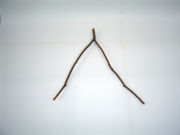Dowsing for Machine Guns August 6, 2010
Author: Beach Combing | in : Contemporary , trackback
The desperate straits to which Britain was reduced in the first year of the Second World War and Churchill’s maverick character thereafter, meant that many ideas were considered in the British military establishment, c. 1940-43, that would not normally have been whispered at an old women’s séance.
Beachcombing recalls the astrologer hired to get inside Hitler’s head, the plan to set the Atlantic on fire, not to mention the scheme to turn glaciers into aircraft carriers. Elements in Britain’s High Command were not so much thinking outside the box as jumping up and down on it.
Some of these schemes will be worth revisiting on another occasion, but tonight Beachcombing wants to share some items from his small and certainly incomplete file on the use of dowsing by British forces in the Second World War.
Dowsing for the uninitiated (and Beachcombing is one such) is a form of divination for the searching out of elements underground, typically employing a y-shaped stick.
The first of these references comes from Peter Fleming’s excellent Operation Sea Lion (175)
…[use of esoteric expedients came] in 1943, when the Japanese, after capturing Hong Kong, Malaya and finally Burma in the previous year, inflicted a local but crushing defeat on Indian Army forces in the Arakan. One of the main tactical problems in jungle warfare had proved to be the extreme difficulty of accurately locating the enemy’s automatic weapons in dense cover, even when they came into action – as they often did – at little more than point blank range. A temporary officer in the RAF, who in happier times had been an enthusiastic water-diviner, claimed to be able to solve this problem. The gift of dowsing, he asserted, was more widely distributed among the human race than most people realised, and it was particularly common among Indians, who formed at that time the bulk of the forces under British command confronting the Japanese. His own experiments had proved that it was just as easy to divine metal as it was to divine water; and he asked only for his powers, which he believed to be shared by at least one man in every section of the infantry, to be tested against British weapons concealed in a training area. They were tested. A form of martial hunt-the-thimble was organised, but the machine-gun-diviner failed in every instance to locate his quarry. He was returned to duty.
Beachcombing wonders what the plan was to have been if the unnamed temporary officer had been able to demonstrate his powers. Would he have shouted out when he found the Japanese machine gun nest hoping that the Japanese machine gunners would award him with a round of applause?
Peter Fleming (incidentally the brother of the creator of James Bond) also related a second case:
Research has failed to disclose what eventually happened to another water-diviner – then serving in the Royal Engineers – whose claims to be able to assess the imminence of invasion [of Britain in autumn 1940] were for a time taken seriously in some quarters. This officer maintained that his gifts enabled him not only to locate but to estimate the size and rate of growth of the supply-dumps which the Germans were accumulating at the invasion ports. Accurate data of this kind were clearly a valuable guide to the enemy’s state of readiness, and the ordnance-diviner was installed in comfortable quarters on the east coast [of Britain] and supplied with aerial photographs and other material calculated to stimulate his extra-sensory powers. Although he achieved nothing to the purpose, this was probably his finest hour.
As Beachcombing has noted above he is no expert on dowsing but this probably describes ‘a remote form using a pendulum’? The wording (‘research has failed to disclose’) makes Beachcombing think ‘urban legend’…
A final reference came in an obituary in the Weekly Telegraph July 20th, 1994: ‘Colonel Kenneth Merrylees, the water-diviner who has died aged 97, worked during the Second World War as a bomb-disposal expert, when he used his dowsing skills to find bombs with delayed-action fuses which had penetrated deep into the ground.’
Beachcombing would love to put names to faces (in the two examples from Fleming). He would also love to find any other examples of dowsing in the Second World War, especially but not only on the part of the British military. DrbeachcombingATyahooDOTcom



